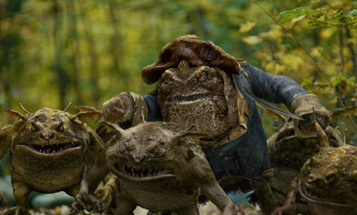|
|
Movie Review: The Spiderwick ChroniclesBy Matthew HuntleyMarch 20, 2008
The villain is an evil troll named Mulgarath (Nick Nolte), who wants Spiderwick's book because it reveals all the secrets of the surrounding estate. Eighty years ago, Spiderwick saved his daughter, a then young Lucinda (Jordy Benattar), from goblins, but during the rescue Spiderwick was whisked away by flower sprites. He's believed to be the only one capable of destroying the book and ridding the house of evil. We've seen similar stories before - The Neverending Story, Labyrinth, Casper - so "he Spiderwick Chronicles isn't the most inspired of films, but director Mark Waters adds plenty of action and special effects to keep it moving. The movie doesn't linger and it is nice how the characters accept their bizarre situations right away without requiring tedious convincing and unnecessary explanations. I also liked the old-fashioned sense of danger and unease the movie created. Today, the idea of putting kids in any real harm seems like it's out of the question. Studios are too afraid a PG-13 rating could cut into their potential audience. But remember the creepiness of Pinocchio, when the badly behaved children were turned into donkeys? Or the uncertain demise of the naughty kids in Willy Wonka and the Chocolate Factory (by contrast, the 2005 version showed all the children leaving the factory safely). Spiderwick brings back some of that lost edge and raises the tension levels by allowing Jared, Simon and Mallory to be hurt. Kids these days are so resilient they're bound to enjoy the excitement that comes with this. I don't foresee Hollywood giving up on children's fantasies any time soon, not when they're so profitable. Spiderwick Chronicles isn't the greatest example of the genre, but it's a good one, with its own sense of magic, fear and adventure that hold our attention, however familiar they may seem.
|

|
|
|

|
Thursday, October 31, 2024
© 2024 Box Office Prophets, a division of One Of Us, Inc.


